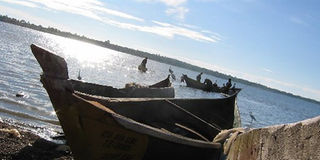I protect the boats from all misfortune

Fishermen on Lake Victoria. Their vessels are cleansed before setting sail in the lake, a ritual common among the lake community. Photo/FILE
What you need to know:
The man who cleanses boats
“The Lake is a very dangerous place; nobody knows the depths or the contents. Very many people have died mysteriously, and their spirits have to be appeased, hence the cleansing ceremonies. One priest came to me in the night wanting me to perform some rituals for him.”
Mr Maurice Adede Mwalo of Koker Kajulu in Kisumu West district.
Sailing on Lake Victoria is not for the fainthearted. Poorly maintained vessels and lack of life jackets are just some of the hazards, besides the unpredictable weather.
But one man insists he has a remedy for the uncertainties, that he can ensure a smooth sail and even bumper haul for fishermen. The man is Mzee Odede Mwalo. The grey-haired lanky old man with a gap in his lower teeth, insists that he means to harm. He has made a name for himself from conducting cleansing ceremonies for boat owners.
“The Lake is a very dangerous place; nobody knows the depths or the contents. Very many people have died mysteriously, and their spirits have to be appeased, hence the cleansing ceremonies.” His trade is closely guarded. He seems to have a monopoly along the beaches around Kisumu, Rarieda and Bondo districts.
All fishermen we spoke to mentioned his name. And how does he cleanse boats? An animal, preferably a goat or chicken, is slaughtered, its blood is mixed with herbal concoctions before being sprinkled on the vessel very early in the morning.
The animal is then roasted in an open fire, and all those in attendance partake of it. With that, the boat is ready for the deep sea. When a boat capsizes its occupants drown, or if a boat regularly gets low catches, a similar ritual is held in the hope that it will bring good tidings in the next sail.
So entrenched is this practice that Christian religious leaders are angling for a share of the token that the cleansers receive, according to 70-year-old Abdala Ajwala, a fisherman. “If you do not cleanse the vessel, you will watch a stream of death and low fish catches,” says Ajwala. “Those who have ignored the advice have ended up calling in for help when it is too late.”
“The lake has dangerous animals like hippopotamus and crocodile, wind directions are unpredictable, and there are evil spirits in the lake. What is wrong with appeasing the spirits?” On the night before a cleansing, Mr Mwalo avoids alcohol and sex.
Although modern religion was eroding his trade, he says people perceived to be strong Christians still approach him under the cover of darkness for his services. “One priest came to me in the night wanting me to perform some rituals for him. He told me that he had been told that I could solve his problems.”
The Anglican Bishop of Maseno West Diocese, Joseph Wasonga, says belief in spirits in the waters has seen even staunch faithfuls ask the clergy to conduct ceremonies for them. “For a long time, the trade has been associated with customary rituals, but now people who have strong beliefs resort to the churches for prayer,” says the Bishop.
He says the tradition is still strong in some of places, especially on islands. Mr Mwalo says that although he does not have a fixed price, the social status of the new vessel owner usually determines how much he can charge.
It is a trade that has been flowing from Mzee Odede Mwalo’s great grandfather to him. Now in his sunset days, he says he has identified one of his sons to take over from him. But Mzee Adhoga Omweno says times have changed.
“There is no need to sacrifice animals to spirits you do not understand,” he says. “If you are a Christian then hold a prayer. This practice is causing fears.”




